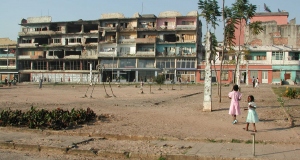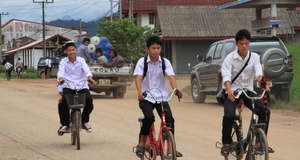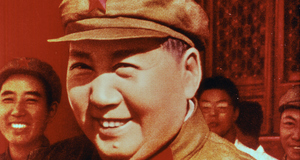|
From Cornell International Affairs Review VOL. 3 NO. 2 No Guts No Glory: Essential Elements For Post-War Reconstruction
By William Way
Cornell International Affairs Review
2010, Vol. 3 No. 2 | pg. 2/2 | «
Seest thou a man diligent in his business? He shall stand before kings. - Proverbs 22:29
Reindustrialization is the fourth essential element for post-war democracy. Without industrialization, post-war countries are weak and easy prey for dictatorship. With industrialization, even former totalitarian countries grow into democratic societies. Germany provides a contrast between one government that promoted industrialization and others that did not. The Weimar and the East German regimes collapsed after failing to achieve post-war reindustrialization to compete on the world market.36, 37
In contrast, in post-war West Germany, the government and the people committed to reindustrialization, and to working long hours at low wages to achieve it. The government promoted exports to drive national recovery and reindustrialization.38 The government also provided large subsidies to promote growth in heavy industries, such as ship and aircraft manufacturing.39 Through its central bank, the government controlled inflation and provided economic stability.40 Through these commitments and hard work, Germany attained world-class economic status and a democratic society.
The Japanese and Korean "economic miracles" are additional examples of successful post-war reindustrialization that produced democracy. In the aftermath of the war, half of Japan's heavy industries laid in ruins.41 During the U.S. occupation, the Japanese vowed to reindustrialize and to rebuild their nation's wealth and power, in order to guarantee their survival as a sovereign nation.42 They committed to the education of their youths. They committed to reinvestment and accepted substandard living conditions in order to plow savings into investments in heavy industries.43
Japanese companies competed for greater market share in the world market through aggressively price-cutting.44 The Japanese government also provided tax exemptions and other subsidies to heavy industries.45 The government pushed businesses to move from medium to heavy industries, then ultimately into knowledge industries. By the 1980s, Japan succeeded in attaining the status of the second largest economy in the world, as well as becoming a leading democratic nation.
Korea's rise to world-class status though reindustrialization is also inspirational. After the Korean War armistice, South Korea was a nation of illiterate peasants. It had neither natural resources nor industry; North Korea controlled those assets on its side of the demilitarized zone.46 Yet South Koreans committed to the survival of their nation as an independent state and to the attainment of world-class economic power. They educated their workforce through military training and university instruction.47
Like the Japanese, they also accepted lower standards of living to pour savings into investments in heavy industries. The Korean government provided tax benefits, contracts, and subsidies to encourage heavy industries and exports.48 Today, Korea has attained leadership status in heavy industries, as well as in knowledge industries. Moreover, they have overcome repeated military coups and enjoy a stable civilian elected government.
Cuba is an example of what happens where there is no post-war industrialization. After the Spanish American War, Cuba was complacent in economic development and chose to continue with legacy sugar plantations as its main industry.49 Without its own medium and heavy industries, Cuba relied on imports from the U.S. for more sophisticated goods and services. The Cuban government and businesses did not aim for world-class industrialization. Ultimately, the government was toppled by military strongman Batista, who was later succeeded later by Castro.
Reindustrialization is essential for post-war democracy in Iraq. Development of its heavy industries will provide Iraq with independence and stability. Iraq has the ability to achieve reindustrialization. Pre-war Iraq had a growing class of professionals.50 Iraq started development of heavy industries, such as steel and aluminum manufacturing, in the 1980s.51 Iraq also produced its own main battle tanks and AWACs.52 The launching of a 48-ton threestage rocket, capable of putting satellites and warheads into orbit, demonstrated Iraq's pre-war technical sophistication.53 Iraq has the assets and the ability to achieve industrialization once the appropriate environment exists. Just as historical examples demonstrate, reindustrialization is essential to bring democracy and freedom to Iraq.
Joint forces commanders successfully contributed to the formation of democratic nations in the aftermath of modern wars, including operations in Germany, Japan, and Korea. By focusing efforts in the four essential areas of long-term U.S. commitment, education, rearmament and reindustrialization, U.S. forces can successfully contribute to bringing about democracy and economic strength in Iraq, Afghanistan and future post-war operations.
- Military governments in Cuba, Germany and Japan have been run by Army Generals, with overall guidance from the joint staff in Washington. For example, Joint Chiefs of Staff Directive 1067 controlled General Lucius Clay’s government of post-war Germany. Clay at 7.
- Hudson, Rex A. (Ed.). (2002). Cuba: a country study (4th ed.). Washington, DC: Library of Congress.
- (Hudson, 2002, p. 33)
- (Hudson, 2002, p. 53)
- Ozment, Steven. (2004). A Mighty Fortress. New York, New York: HarperCollins.
- Bark, Dennis L., & Gress, David R. (1989). A History of West Germany. Cambridge, MA: Basil Blackwell.
- (Bark, 1989, p. 345, 392)
- (Cumings, 1997, p. 186, 200)
- Savada, Andrea Matles, & Shaw, William (Eds.). (1992). South Korea: a country study (4th ed.). Washington, DC: Library of Congress., p. 120
- (Cumings, 1997, p. 322)
- Cohen, Theodore. (1987). Remaking Japan: the American Occupation as New Deal. New York, New York: Free Press., p. 4
- (Cohen, 1987, p. 456)
- Dower, John W. (1999). Embracing Defeat. New York, New York: W.W. Norton & Company. p. 23
- (Bark, 1989, p. 345)
- Solsten, Eric (Ed.). (1996). Germany: a country study (3rd ed.). Washington, DC: Library of Congress. p. 440
- (Cumings, 1997, p. 311)
- (Savada, 1992, p. 115)
- (Cumings, 1997, p. 318)
- (Savada, 1992, p. 35)
- Metz, Helen C. (Ed.). (1990). Iraq: a country study (4th ed.). Washington, DC: Library of Congress., p. 244
- (Savada, 1992, p. 38)
- (Savada, 1992, p. 62)
- Dolan, Ronald E., & Worden, Robert L. (Eds.). (1992). Japan: a country study (5th ed.). Washington, DC: Library of Congress. p. 136
- (Dolan, 1992, p. 136)
- (Dolan, 1992, p. 198)
- (Dolan, 1992, p. 136)
- (Cumings, 1997, p. 300)
- (Savada, 1992, p. 120)
- (Savada, 1992, p. 192)
- (Savada, 1992, p. 62)
- (Hudson, 2002, p. 33)
- (Hudson, 2002, p. 65)
- (Hudson, 2002, p. 45)
- (Metz, 1990, p. 108)
- (Metz, 1990, p. 114)
- (Solsten, 1996, p. 75)
- (Ozment, 2004, p. 252)
- (Bark, 1989, p. 392)
- (Solsten, 1996, p. 338)
- (Solsten, 1996, p. 248)
- (Cohen, 1989, p. 4)
- (Dolan, 1992, p. 198)
- (Dolan, 1992, p. 201)
- (Dolan, 1992, p. 202)
- (Dolan, 1992, p. 206)
- (Savada, 1992, p. 29)
- (Cumings, 1997, p. 311)
- (Savada, 1992, p. 43)
- (Hudson, 2002, p. 53)
- (Metz, 1990, p. 108)
- (Metz, 1990, p. 152)
- (Metz, 1990, p. xxix)
- (Metz, 1990, p. xxix)
Photos courtesy of:
- “Provincial Reconstruction Team, Panjshir, Afghanistan.” Wikimedia Commons. 3 April 2010. http://upload.wikimedia.org/wikipedia/commons/3/37/Provincial_Reconstruction_Team,_Panjshir,_Afghanistan.jpg
Endnotes
- Military governments in Cuba, Germany and Japan have been run by Army Generals, with overall guidance from the joint staff in Washington. For example, Joint Chiefs of Staff Directive 1067 controlled General Lucius Clay’s government of post-war Germany. Clay at 7.
- Hudson, Rex A. (Ed.). (2002). Cuba: a country study (4th ed.). Washington, DC: Library of Congress.
- (Hudson, 2002, p. 33)
- (Hudson, 2002, p. 53)
- Ozment, Steven. (2004). A Mighty Fortress. New York, New York: HarperCollins.
- Bark, Dennis L., & Gress, David R. (1989). A History of West Germany. Cambridge, MA: Basil Blackwell.
- (Bark, 1989, p. 345, 392)
- (Cumings, 1997, p. 186, 200)
- Savada, Andrea Matles, & Shaw, William (Eds.). (1992). South Korea: a country study (4th ed.). Washington, DC: Library of Congress., p. 120
- (Cumings, 1997, p. 322)
- Cohen, Theodore. (1987). Remaking Japan: the American Occupation as New Deal. New York, New York: Free Press., p. 4
- (Cohen, 1987, p. 456)
- Dower, John W. (1999). Embracing Defeat. New York, New York: W.W. Norton & Company. p. 23
- (Bark, 1989, p. 345)
- Solsten, Eric (Ed.). (1996). Germany: a country study (3rd ed.). Washington, DC: Library of Congress. p. 440
- (Cumings, 1997, p. 311)
- (Savada, 1992, p. 115)
- (Cumings, 1997, p. 318)
- (Savada, 1992, p. 35)
- Metz, Helen C. (Ed.). (1990). Iraq: a country study (4th ed.). Washington, DC: Library of Congress., p. 244
- (Savada, 1992, p. 38)
- (Savada, 1992, p. 62)
- Dolan, Ronald E., & Worden, Robert L. (Eds.). (1992). Japan: a country study (5th ed.). Washington, DC: Library of Congress. p. 136
- (Dolan, 1992, p. 136)
- (Dolan, 1992, p. 198)
- (Dolan, 1992, p. 136)
- (Cumings, 1997, p. 300)
- (Savada, 1992, p. 120)
- (Savada, 1992, p. 192)
- (Savada, 1992, p. 62)
- (Hudson, 2002, p. 33)
- (Hudson, 2002, p. 65)
- (Hudson, 2002, p. 45)
- (Metz, 1990, p. 108)
- (Metz, 1990, p. 114)
- (Solsten, 1996, p. 75)
- (Ozment, 2004, p. 252)
- (Bark, 1989, p. 392)
- (Solsten, 1996, p. 338)
- (Solsten, 1996, p. 248)
- (Cohen, 1989, p. 4)
- (Dolan, 1992, p. 198)
- (Dolan, 1992, p. 201)
- (Dolan, 1992, p. 202)
- (Dolan, 1992, p. 206)
- (Savada, 1992, p. 29)
- (Cumings, 1997, p. 311)
- (Savada, 1992, p. 43)
- (Hudson, 2002, p. 53)
- (Metz, 1990, p. 108)
- (Metz, 1990, p. 152)
- (Metz, 1990, p. xxix)
- (Metz, 1990, p. xxix)
Photos courtesy of:
- “Provincial Reconstruction Team, Panjshir, Afghanistan.” Wikimedia Commons. 3 April 2010. http://upload.wikimedia.org/wikipedia/commons/3/37/Provincial_Reconstruction_Team,_Panjshir,_Afghanistan.jpg
Suggested Reading from Inquiries Journal
Angola today is framed by a history of violent conflict that has left the population far behind on all major indicators. Lacking a democratic culture, the country faces two significant challenges: first, the challenge of... MORE»
Although education is at the forefront of innumerable research and development initiatives, some countries remain significantly under-researched. While increasing statistics exist on development indicators and education in The Lao PDR (hereafter Laos), there has been minimal qualitative insight into students’ views of education... MORE»
This article uses two decision-making theories – rational choice theory and prospect theory – to examine China’s resolution to intervene militarily in the Korean War. I argue that Chairman Mao Zedong was in a domain of loss both domestically and internationally when the U.N. Command crossed the 38 Parallel and... MORE»
“News is something someone wants suppressed,” British newspaper baron Lord Northcliffe once said. “Everything else is just advertising.” This point is especially true in war journalism where every story, be it a heart-warming depiction of troops handing out candy to local children or a gut-wrenching depiction of the horrors of war, can be construed as propaganda. Militaries of countries that protect the freedom of the press... MORE»
Latest in International Affairs
2022, Vol. 14 No. 04
With over 10 million stateless people globally, statelessness has increasingly become a pressing issue in international law. The production of statelessness occurs across multiple lines including technical loopholes, state succession, and discriminatory... Read Article »
2021, Vol. 13 No. 09
The COVID-19 crisis has exacerbated current global challenges. However, this article argues that this time of crisis can also be a unique opportunity for the existing global economic institutions - G20, WTO, IMF, and World Bank (WB) - to make the... Read Article »
2021, Vol. 13 No. 02
On January 1st, 1959, a small band of Cuban rebels shocked the world, overthrowing the American-backed dictator Fulgencio Batista. These rebels were especially known for their guerrilla tactics and their leaders, such as Fidel Castro and Ernesto... Read Article »
2021, Vol. 13 No. 01
Israel has increased the nation’s security presence around the Gaza Strip and in the West Bank. Here, the research project analyzes how transaction costs resulting from Israeli security policy impact the output of manufacturing activities... Read Article »
2020, Vol. 12 No. 09
The necessity of international relief is unending as new crises continue to emerge across the world. International aid plays a crucial role in shaping how affected communities rebuild after a crisis. However, humanitarian aid often results in a... Read Article »
2019, Vol. 11 No. 10
This article aims to present the biopiracy of traditional knowledge from India by the United States, which has occurred directly through the use of patent law and indirectly through economic power and cultural imperialism. Throughout this essay,... Read Article »
2018, Vol. 10 No. 10
After joining the European Union (EU) and the North Atlantic Treaty Organization (NATO) in 2004, Estonians felt secure and in charge of their future. However, following the 2007 Bronze Horseman incident in the Estonian capital of Tallinn which included... Read Article »
|


















